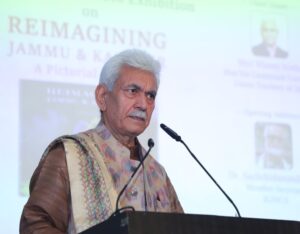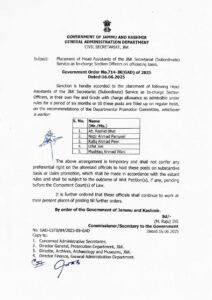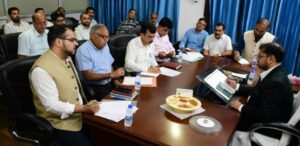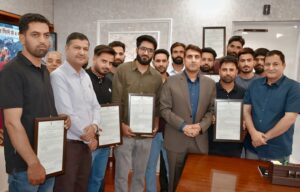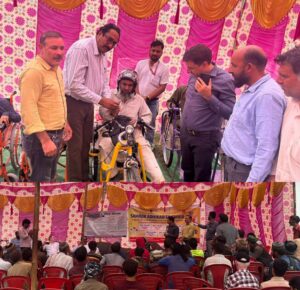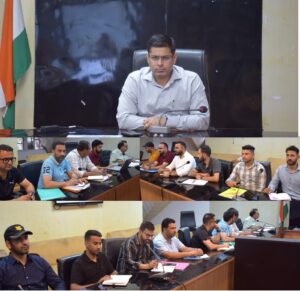CS for leveraging technology, global tie-ups to popularise J&K handicrafts
SRINAGAR, JUNE 16: Chief Secretary, Atal Dulloo, today chaired a high-level meeting to review the ongoing and proposed initiatives of the Handicrafts & Handloom Department aimed at promoting and preserving the rich craft heritage of Jammu & Kashmir, while simultaneously improving the socio-economic condition of artisans and weavers.
The meeting was attended by Commissioner Secretary, Industries & Commerce, Vikramjit Singh; MD, JKTPO; Directors of Handicrafts & Handloom, Kashmir and Jammu, besides other senior officers.
Underscoring the global demand for authentic and high-quality handmade products, the Chief Secretary stressed the need to safeguard the interests of genuine artisans by leveraging modern technological interventions. He called for widespread use of Geographical Indications (GI), QR code tagging, traceability tools and digital authentication mechanisms to clearly distinguish the original handmade products from counterfeits.
He directed the department to aggressively follow up with the Government of India for expediting approvals of dozens of project proposals submitted for promotion of various crafts across the UT. He emphasised the need to designate a senior nodal officer to spearhead the coordination and ensure timely clearances of these projects.
The Chief Secretary also called for fast-tracking the signing of the Memorandum of Understanding (MoU) with the World Craft Council. He said this partnership is expected to significantly elevate the global footprintof J&K’s traditional crafts by establishing a World Craft Hub and Living Crafts Museum, envisioned as an international centre for craft preservation, innovation, and exchange.
Dulloo further highlighted the need for consistent promotion at national and international levels, leveraging not just conventional marketing channels but also digital and social media platforms. He remarked that the market for our crafts is vast, and we must tap into its full potential to uplift the lives of our artisan community.
Reviewing the progress on Ekta Malls being established in Jammu and Srinagar, the Chief Secretary urged for their timely completion. These malls are envisioned as dedicated platforms to showcase and sell indigenous products, enabling artisans to directly connect with consumers.
Commissioner Secretary, I&C, Vikramjit Singh, during his presentation, elaborated on the post-2020 policy reforms that have led to structured support for artisans, improved market access and revitalised the traditional craft economy in the UT. He noted that these initiatives paved the way for GI protection, upgraded infrastructure andfinancial empowermentof the artisan community.
He highlighted flagship interventions like the Credit Card Scheme for Artisans (CCSA), Financial Support Scheme for Cooperatives/SHGs, Karkhandar Scheme, Raw Material Banks, and Artisan Education Schemes—all aimed at holistic upliftment of artisans and weavers across J&K.
Regarding the key infrastructure and promotional projects, Director, Handicrafts & Handloom, Kashmir, Masrat-ul-Islam, provided a detailed overview of recent initiatives, including the establishment of Craft Villages, Common Facility Centres (CFCs), Flatted Factories, De-hairing Plants, Bamboo Clusters and Craft-Based Resource Centres in various districts.
Notable among the proposed projects are Craft Village at Sonpah, Budgam, Wool CFC at Nowshera, Srinagar, Flatted Factories at Mujgund, De-hairing Plant at CDI Nowshera, Bamboo Cluster at Samba, Indian Institute of Textiles/Handlooms at Basohli, Promotion of Handloom Sector in Jammu, Block-level Craft Training Centres and dozens more proposals submitted for approval of GoI for their funding.
The meeting was informed that J&K remains the only UT/State in the country to offer GI tagging for its entire craft basket. Each GI-certified product features a QR code label embedded with crucial details like artisan identity, material used, and place of origin. Recent procurement of a high-resolution digital microscope worth Rs30 lakh has significantly reduced the GI application backlog—from 1709 in February 2025 to just 150 in June 2025.
So far, 15 crafts from Kashmir and 3 from Jammu have been granted GI status, with several more under proposal. With respect to Kashmir Sozni, Hand Knotted Carpet, Pashmina, Kani Shawls, Paper Mache, Walnut Wood Carving, Khatamband, Crewel, Namda, Kashmir Tweed, Gabba, Wagguv, Chain Stitch, Shikara, and Bat making had received the GI with 6 more submitted this year.
Similarly, for Jammu GI Crafts included Basohli Pashmina, Rajouri Chikri Wood, Basohli Painting had already received GI tag in 2023 with 4 more proposed for 2025-26 and 6 in pipeline.
With respect to capacity building and export performance, it was informed that currently 634 craft training centres operate across the UT, offering formal training in various handicrafts and handloom traditions including Massive Carpet Training Centres.
Exports of handicrafts from J&K have also shown remarkable fluctuations, peaking at Rs 1116.37 crore in 2022-23, with Rs 733.59 crore reported in 2024-25, reflecting the sector’s critical contribution to the economy.
The department continues to actively participate in national-level expos and trade fairs, generating a revenue of Rs 9.64 crore from 15 exhibitions last year. The department is collaborating with JKTPO to provide free or subsidised stalls to artisans to maximise the visibility and generate business leads, as was given out in the meeting.

